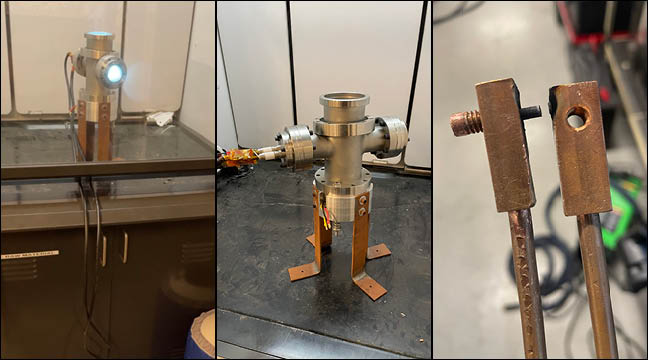Patrick O'Malley is 3rd-year Aerospace Engineering major studying electric plasma jet thrusters with Dr. Lukas Graber.
How long have you been an undergraduate researcher at Georgia Tech?
I joined the Plasma and Dielectrics Lab (PDL) in Spring 2022 as a first-year and have been working there ever since.
How did you get involved with undergraduate research?
I asked some friends for advice on getting involved in research at Georgia Tech and they recommended some labs that I might be interested in. Eventually, I heard about experiments with electric plasma jet thrusters at PDL led by Dr. Lukas Graber. I talked to some of the researchers at PDL about their experience with the lab. I sent an email to Dr. Graber asking about the research and if there was any way I could get involved. Soon after, I started attending meetings and helping with experiment set-up. Later, I was tasked with designing electrical components for new experiments.
What are you working on?
My lab has been focused on experimenting with electric plasma jet thrusters. For the past three semesters, I’ve worked on analyzing the effects of voltage and current inputs on electrode erosion during plasma arcing. We tested a variety of materials such as copper, tungsten, and carbon fiber electrodes and found which materials resist erosion while also taking into consideration other factors such as the materials’ thermal conductivity, electrical conductivity, and melting point. My research has recently shifted to modeling fluid flow and heat radiation to get a better idea of how the flow behaves inside the plasma chamber and find ways to increase heat transfer and stability within the chamber.

What is your favorite thing about research/researching?
My favorite part of research is the moment of satisfaction I get when an experiment, that might have taken weeks or even months to plan, goes successfully. Oftentimes, when setting up an experiment, issues come up that lead to more questions, revisions, and additional tests. The payoff is always worth it though, and I learn so much from the work I do, even if it doesn’t always go according to plan. One interesting part of research is finding unexpected results from an experiment. I find that research often leaves me with more questions than answers, but the exciting part is that those questions often lead to new experiments. I’ve learned so much just from getting involved in research and it’s cool to see the topics I’ve learned in class apply to real-life situations.
What are your future plans and how has research influenced them?
Aerospace engineering is a broad field and I’m still exploring the many specializations it encompasses, but no matter what I choose to focus on in the future, researching at PDL has helped prepare me to take on any challenges I might face. Not only did I gain a variety of useful technical skills, but I also learned how to become a more creative problem solver, how to adapt to new information quickly, and how to effectively collaborate on a team. My experience with research and the skills learned there will definitely be a tremendous help while working in the fast-paced and ever-evolving aerospace industry.
